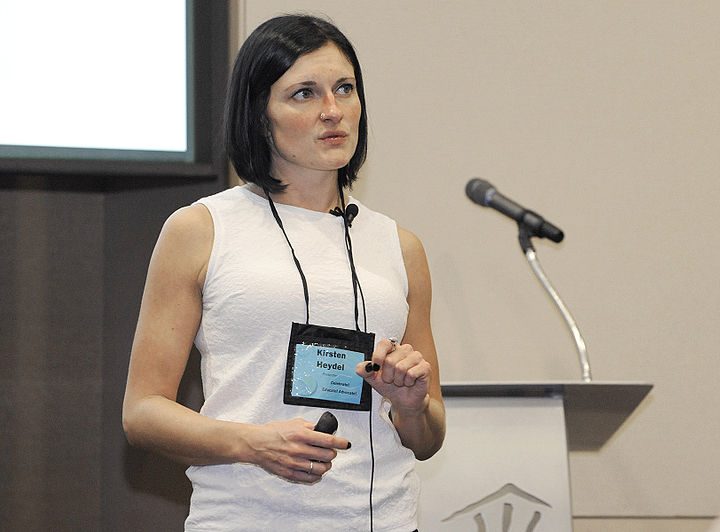Winner of the Fall 2018 StMU History Media Award for
Best Article in the Category of “Human Rights”
Have you ever wanted to make some easy money by selling your old stuff? Thanks to websites like Craigslist and Backpage, you can. Both Craigslist and Backpage are two of the largest classified advertisement websites. They allow you to search for and sell items in and around your local area. They even give you the option to post advertisements for job listings, events and activities. Craigslist was founded in 1995, and Backpage was founded in 2004.1 Craigslist is owned by its founder Craig Alexander Newmark, and Backpage was formerly owned by Village Voice Media and was run by its former CEO Carl Ferrer. Backpage is now owned by a Dutch company called Atlantische Bedrijven CV.2 These websites may seem like a harmless way to look for products and services, but the truth is these websites had a personal ad section that made it easy for young girls and women to be sexually exploited.

The personal ad section on these websites allowed for people to meet men and women in their area. Typically, these ads were used to find someone to date or with whom to have casual sex. Although these personal ad sections were intended for people to connect and interact with other persons, they were misused. These ads turned into the perfect platform for pimps and traffickers to promote the sale of women and children for sex. As shocking as it sounds, research has shown that the internet is a common tool for sex traffickers to use. Using the internet allows traffickers to reach a larger number of potential clients while eluding law enforcement.3 For them, the internet is the safest way to make money. The service providers Craigslist and Backpage, however, did nothing to stop people from using their websites in this way. Instead of preventing the ads from being posted or taking them down, they published them.
Several people filed lawsuits against Craigslist and Backpage because they wanted these websites to be held liable for publishing sex ads.4 After being faced with backlash, Craigslist and Backpage agreed to implement some requirements for their advertisements. In 2008, Craigslist required a fee for those persons posting in the “adult services” part of their personal ad section. The fee ranged between 5-10 U.S. dollars per ad. People would need to use a valid credit card and provide a verifiable phone number. This requirement, however, did not have much of an impact. Many traffickers simply used fake credit cards and phone numbers to pay the fee.5 Through these fees, Craigslist and Backpage made a huge profit. Craigslist made $44.6 million from their adult services advertisements and Backpage made $24 million.6 Their adult section, however, was the only one with a fee attached. To get around the fee, people would simply post their sex ads in other sections. Another attempt made by Craigslist and Backpage to reduce the chances of sex trafficking was removing posts with words such as “sexy” and “young.” This also proved to be ineffective. People would use code words so that their ads would not be removed. For example, pimps and traffickers used words like ‘new’ to indicate that the girl was a minor. Backpage even helped to edit advertisements by changing the words so that they would not get flagged or reported.7 The websites changes were not effective in reducing the number of sex ads posted. Craigslist and Backpage still failed to consistently block ads for illegal activity such as sex trafficking.

Many women and children were trafficked through these websites. In one case, three young women were repeatedly raped while they were minors when they were sold through Backpage’s website. Each of these victims filed a lawsuit against Backpage back in October 2014. This case is known as Doe v. Backpage.com. The lawsuit claimed that the classified ad company had engaged in sex trafficking of minors. They argued that the websites were engaged in trafficking since they did such a poor job in governing the content of the ads being posted. The U.S. Court of Appeals for the First District ruled in favor of Backpage and held that Backpage was protected under U.S. Code Title 7 Section 230, more commonly known as the Communications Decency Act (CDA). 8
] The purpose of the CDA is to regulate interactive computer services. The CDA makes it the policy of the United States “to preserve the vibrant and competitive free market that presently exists for the Internet and other interactive computer services” and “to ensure vigorous enforcement of Federal criminal laws to deter and punish trafficking in obscenity, stalking, and harassment by means of computer.”9
In their decision, the Court of Appeals argued that by claiming that Backpage facilitates sex trafficking through its posting rules, you are treating Backpage as the publisher of the content which the CDA prohibits. Section 230 subsection (c) states, “No provider or user of an interactive computer service shall be treated as the publisher or speaker of any information provided by another information content provider.”10 The Court believed that Backpage should not be held responsible for what its customers convey on its website. Just a year prior to this case, another lawsuit was brought against Backpage. This case was Backpage.com, LLC v. Cooper. In this case, just like in Doe v. Backpage.com, Backpage argued that they had no knowledge of the content posted on their website. The Court ruled that their classified ads were protected under the First Amendment of the Constitution. They argued that it is unlawful to censor an entire category of speech on a website. They also stated that it would place “an impossible burden” on Backpage to review the millions of ads posted on its website.11
Just like Backpage, Craigslist was faced with numerous lawsuits. Those who brought lawsuits against Craigslist wanted them to be liable and accountable for allowing such advertisements to be published on their website.12 Many advocates fought hard against these two companies. They wanted the sex advertisements on these websites to be criminalized, and to put an end to the use of online classified ads to exploit both adults and children.

The most recent legislation dealing with online sex trafficking was introduced by the Senate. Earlier this year, it was passed by Congress. This piece of legislation is an anti-sex-trafficking bill known as the Stop Enabling Sex Traffickers Act. This act is an exception to Section 230 of the CDA. This Act states, “section 230 was never intended to provide legal protection to websites that facilitate traffickers in advertising the sale of unlawful sex acts with sex trafficking victims; and that clarification of section 230 is warranted to ensure that that section does not provide such protection to such websites.“13 Essentially, this Act allows for sex trafficking victims to sue the websites through which they were trafficked. As a result from the passing of this bill, Craigslist shut down its personal ad section; however, this website remains active today. Backpage, on the other hand, was seized by the FBI and it remains seized to this day. Although action was taken against these websites, there are still several other active websites similar to Craigslist and Backpage. Those who relied on the two sites for sex trafficking have turned to other places on the internet. Shutting down sex advertisements in these cases have not stopped pimps from trafficking young girls and women online; it has just moved their operations to other providers. Despite efforts to target and censor websites like Craigslist and Backpage, trafficking displacement is an inevitable consequence.14 The FBI, however, is making an effort to monitor different forms of illegal activities online, especially sex trafficking. One way we can help fight online sex trafficking is by going after those websites that allow it to happen. If you go to the FBI website, you will find information on how to report instances of human trafficking. The FBI informs us to call the National Human Trafficking Resource Center (NHTRC) if we believe that we are a victim of a trafficking situation or if we have information on a potential trafficking situation. We can reach the NHTRC at 1-888-373-7888, where we can talk to specialists who answer calls at anytime from anywhere. 15 Do not be afraid to seek out help or to report what you believe may be a trafficking situation. Let’s help put an end to online sex trafficking!
- Shana M. Judge, “The Effect of Measures Taken by Craigslist to Screen Online Ads for Commercial Sex,” Social Science Computer Review 36, no. 3 (June 2018): 298. ↵
- Marie- Helen Maras, “Online Classified Advertisement Sites: Pimps and Facilitators of Prostitution and Sex Trafficking,” Journal of Internet Law 21, no. 5 (2017): 17. ↵
- Erin Heil and Andrea Nichols, “Hot Spot Trafficking: A Theoretical Discussion of the Potential Problems Associated with Targeted Policing and the Eradication of Sex Trafficking in the United States,” Contemporary Justice Review 17, no. 4 (2014): 422. ↵
- Shana M. Judge, “The Effect of Measures Taken by Craigslist to Screen Online Ads for Commercial Sex,” Social Science Computer Review 36, no. 3 (June 2018): 298. ↵
- Shana M. Judge, “The Effect of Measures Taken by Craigslist to Screen Online Ads for Commercial Sex,” Social Science Computer Review 36, no. 3 (June 2018): 299. ↵
- Erin Heil and Andrea Nichols, “Hot Spot Trafficking: A Theoretical Discussion of the Potential Problems Associated with Targeted Policing and the Eradication of Sex Trafficking in the United States,” Contemporary Justice Review 17, no. 4 (2014): 428. ↵
- Erin Heil and Andrea Nichols, “Hot Spot Trafficking: A Theoretical Discussion of the Potential Problems Associated with Targeted Policing and the Eradication of Sex Trafficking in the United States,” Contemporary Justice Review 17, no. 4 (2014): 429. ↵
- Kerianne Strachan, “Doe v. Backpage.com: The United States Court of Appeals Further Extends Immunity for Internet Service Providers Under the Communications Decency Act,” Tulane Journal of Technology & Intellectual Property 19, (2016): 262 and 47 U.S. Code § 230 – Protection for private blocking and screening of offensive material, and S.652 – Telecommunications Act of 1996 enacted by 104th Congress (1995-1996). ↵
- § 230. Protection for private blocking and screening of offensive material, 47 USCS § 230 ( Current through PL 115-253, approved 10/3/18 ). https://advance-lexis-com.blume.stmarytx.edu/api/document?collection=statutes-legislation&id=urn:contentItem:4YF7-GV61-NRF4-44C3-00000-00&context=1516831. ↵
- § 230. Protection for private blocking and screening of offensive material, 47 USCS § 230 ( Current through PL 115-253, approved 10/3/18 ). https://advance-lexis-com.blume.stmarytx.edu/api/document?collection=statutes-legislation&id=urn:contentItem:4YF7-GV61-NRF4-44C3-00000-00&context=1516831. ↵
- Marie-Helen Maras, “Online Classified Advertisement Sites: Pimps and Facilitators of Prostitution and Sex Trafficking,” Journal of Internet Law 21, no. 5 (2017): 18. ↵
- Shana M. Judge, “The Effect of Measures Taken by Craigslist to Screen Online Ads for Commercial Sex,” Social Science Computer Review 36, no. 3 (June 2018): 298. ↵
- S. 1693, 115th Cong. (2018) Stop Enabling Sex Traffickers Act (enacted). ↵
- Erin Heil and Andrea Nichols, “Hot Spot Trafficking: A Theoretical Discussion of the Potential Problems Associated with Targeted Policing and the Eradication of Sex Trafficking in the United States,” Contemporary Justice Review 17, no. 4 (2014): 432. ↵
- “Human Trafficking/Involuntary Servitude.” FBI. May 03, 2016. Accessed October 30, 2018. https://www.fbi.gov/investigate/civil-rights/human-trafficking. ↵



180 comments
Melanie Fraire
This article was very difficult to get through especially when the amount of money paid in fees was shown because the profit that both websites made was extremely high so it makes you think just how many victims that amount equals to. It’s good that this issue is receiving constant attention from the FBI since I know many women fear being sex trafficked and I hope one day we can live without the fear of being sold to sex traffickers.
Ana Jimenez
Just reading about this makes me sick to my stomach. Sex-trafficking is a big issue that has been going on for decades and continues to grow every decade. It is extremely saddening that companies and websites such as Craigslist and Backpage were not using the best of their abilities to prevent the trafficking of women and children. Overall, interesting read and great article.
Juliana Montoya
The article was very eyeopening especially because the sites are very commonly used throughout many groups of people. It was very unsettling to discover that the websites were being used for a horrible purpose and that nobody tried to stop it for the longest time. I loved that the article included the hotlines for the National Human Trafficking Resource Center.
Savannah Alcazar
This article kept my attention the entire time. I had no idea that people used websites like Craigslist and Backpage to traffic humans. This article is incredibly informative about this topic. It shows how people can use a great tool such as the internet for terrible things. It’s terrifying if you think about how many women and children go missing everyday in the United States. Good read.
Samantha Zamorano
Wow, reading this article made me super upset. If we’re not uncomfortable we’re not listening. What made me really upset reading the article is how in the case of Doe v Backpage.com, the court ruled in favor of Backpage because of the CDA. CDA says the policy of the U.S. is to preserve the free market; but at what cost? Because of this country’s love of capitalism, we’re going to sit back and not protect defenseless little boys and girls? The money requirement for posting an ad did absolutely nothing but make Craigslist a profit. What is 5-10 dollars for a sex trafficking ring that makes hundreds of thousands of dollars? Clearly, Craigslist knew they were at fault after the Stop Enabling Sex Traffickers Act because they removed their personal ad page. I’m glad there’s a much higher awareness of sex trafficking schemes and prctices today.
Lesley Martinez
Before reading this article, I had no idea that Craigslist and Backpage were used to sexually exploit adults and children. It’s also shocking to know that Craigslist and Backpage did nothing to put an end to these ads, even after knowing it was going on until they received backlash from the public. I’m glad to hear that the Stop Enabling Sex Traffickers Act was passed as a step towards attempting to prevent occurrences of sex-trafficking. This was a very alarming and informative article and I’m glad I was able to learn from it.
Nicole Ortiz
I had not been aware before that Craigslist was used for sex trafficking. I knew that it was used as a way to buy things and to do other things but now that i know this was done on the website, it makes me kinda hesitant to use websites like that. This was such a well informed and detailed article and i’m so glad that it was written to raise awareness about this issue of sex trafficking that is such a common issue in our society today
Felipe Macias
The websites in which were outlets for sexual trafficking are not the culprits. Yes, they hosted horrible adverts for pimps and women, but this was not done under their watch. It is similar to how any other social media outlet functions. The platform is there for the public and the users use it to how they please. Their intentions can then be investigated, while the platform only works as a catalyst.
Ashley Martinez
This was a very sad and upsetting article to read about. It is awful to see that sex trafficking is everywhere you turn. It is awful to read about sick people who are very involved in sex trafficking and will do anything to get what they want. Despite this controversial topic this article was a very informative article that showcased the facts and explained using great detail. I have never read about backpage before reading this article. This article was well written and easy to follow along with.
Alin Bocardo Felix
Sex trafficking is a growing issue near border cities and areas that are poverty-ridden, although it is unfortunate, I disagree with the fact that the websites are promoting sex trafficking in any way. The websites were designed to promote ads, and although it is their fault for their lack of regulations regarding the subject, it is not solely on their part. People use what they are given for good and for bad, and if people found loopholes quicker than the websites were able to regulate, it is not on their part. The article is concise but very explanatory, great writing.